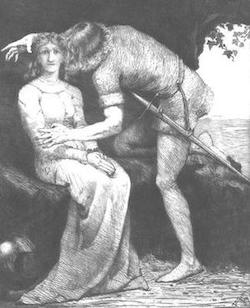| BACK PAGE |
 Select Poems by John Keats |
NEXT PAGE |
La Belle Dame Sans Merci

I
AH, what can ail thee, wretched wight,
Alone and palely loitering;
The sedge is wither'd from the lake,
And no birds sing.
II
Ah, what can ail thee, wretched wight,
So haggard and so woe-begone?
The squirrel's granary is full,
And the harvest's done.
III
I see a lilly on thy brow,
With anguish moist and fever dew;
And on thy cheek a fading rose
Fast withereth too.
IV
I met a lady in the meads
Full beautiful, a faery's child;
Her hair was long, her foot was light,
And her eyes were wild.
V
I set her on my pacing steed,
And nothing else saw all day long;
For sideways would she lean, and sing
A faery's song.
VI
I made a garland for her head,
And bracelets too, and fragrant zone;
She looked at me as she did love,
And made sweet moan.
VII
She found me roots of relish sweet,
And honey wild, and manna dew;
And sure in language strange she said,
I love thee true.
VIII
She took me to her elfin grot,
And there she gaz'd and sighed deep,
And there I shut her wild sad eyes—
So kiss'd to sleep.
IX
And there we slumber'd on the moss,
And there I dream'd, ah woe betide,
The latest dream I ever dream'd
On the cold hill side.
X
I saw pale kings, and princes too,
Pale warriors, death-pale were they all;
Who cry'd—"La belle Dame sans merci
Hath thee in thrall!"
XI
I saw their starved lips in the gloam
With horrid warning gaped wide,
And I awoke, and found me here
On the cold hill side.
XII
And this is why I sojourn here
Alone and palely loitering,
Though the sedge is withered from the lake,
And no birds sing.
— John Keats, 1820
